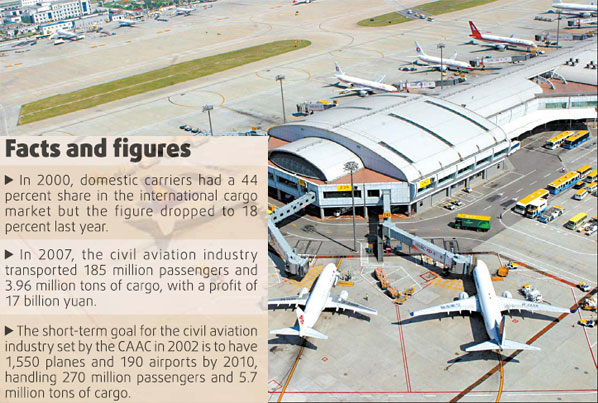Miles to go in fulfilling aviation ambition

Any other top boss of a domestic cargo carrier might have felt relieved after last year's air cargo volume topped the previous year's, but not Li Jiaxiang.
In his first public appearance, the newly appointed acting director of China's civil aviation administration expressed concerns about domestic cargo airlines' future. The country's cargo airlines are losing market share on international routes, especially in the cargo transport market, he said.
In 2000, domestic carriers had a 44 percent share in the international cargo market but the figure dropped to 18 percent last year.
The percentage of passenger transport on international routes has also declined, from 56 percent in 2000 to 44 percent last year.
"There is a danger that China's cargo airlines are being marginalized in the world air cargo market," he said.
Cao Yunchun, professor with Tianjin-based Civil Aviation University of China, said it is a sign that Chinese carriers' competitive advantage is weakening in the international market.
"More significantly, this signals a big obstacle to China's goal of becoming a strong power in civil aviation," Cao said.
The General Administration of Civil Aviation of China (CAAC) in 2002 set the goal that the country should develop a strong civil aviation industry by 2020. The short-term goal for 2010 is to have 1,550 planes and 190 airports, handling 270 million passengers and 5.7 million tons of cargo.
Last year, the industry transported 185 million passengers and 3.96 million tons of cargo. With everything going according to plan, the industry reaped a profit of 17 billion yuan.
The figures are encouraging but "also dangerous because domestic carriers tend to get complacent and drop their guard", Cao said.
Chinese carrier managers need to make two things very clear.
First, as Li says, the industry's profits should be attributed to the fuel surcharge and the gains from exchange rate changes because of the renminbi's appreciation, "which does not deserve any joy and satisfaction".
Second, the domestic airlines' gains are mainly from the domestic market, which is protected from foreign competitors anyway.
Li, former general manager of China National Aviation Holding Co, realizes it's time to do something. He told a working conference that emerging as a strong power in civil aviation must be the key goal for the CAAC this year, and specific targets and indexes will be mapped out to reach that goal.
Chinese cargo airlines still lag far behind the giants in the industry. Cao said China owned only 50 cargo planes in 2007.
Compared with logistics giants such as FedEx and UPS, domestic cargo carriers lack a widespread network and ability to convince transnational cargo operators that they, too, can deliver on time, Cao said.
The two companies' international air hubs in Shanghai and Guangzhou respectively will come into operation this year.
"After they sort out the ground transportation network in two to three years, their competitiveness in China will be stronger by 2009, and things will get even worse for domestic carriers," Cao said.
He disagrees with some who say China is opening up its skies too fast, causing the loss in international market share.
"Opening the skies is inevitable. The problem is how to compete with others. How to be more competitive is what domestic airlines should think about," he said.
After a month of initial probing since Li's appointment, he encouraged domestic airlines to launch more long-distance flights to Europe and North America and raise international market share.
Li also said the arrival of the new Boeing 787 and Airbus 380 is a good opportunity for Chinese airlines to launch more international flights.
(China Daily 03/18/2008 page15)














